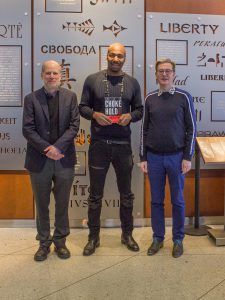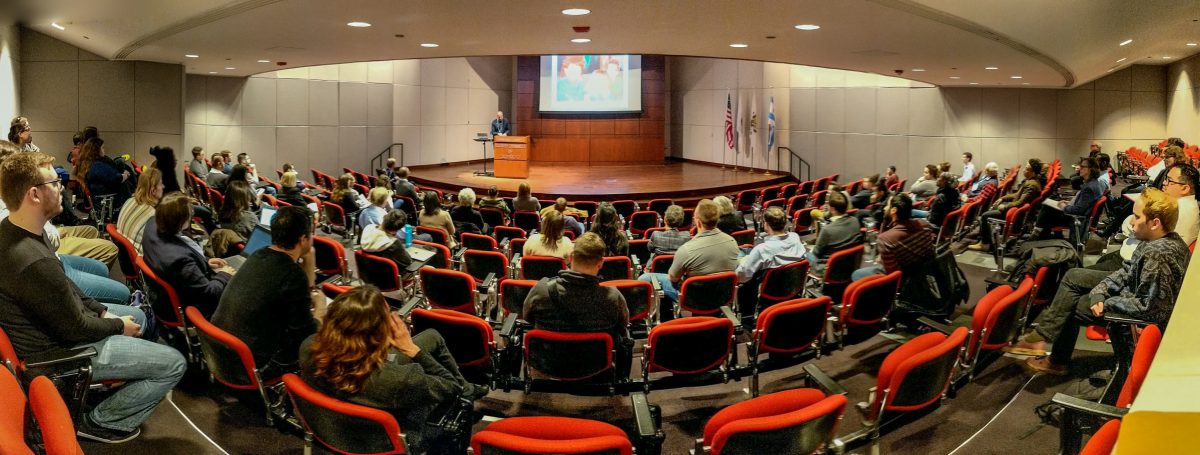
On April 10, 2019 Professor Paul Butler of Georgetown Law discussed his book Chokehold: Policing Black Men in an author’s book talk.
He offered an overview of the ways the criminal justice system affects African Americans, starting by contrasting different definitions of the problems and moving on to describe a range of historical responses and current abolitionist strategies.
The talk concluded with an open question and answer session with faculty, staff and students and a call to action from Professor Butler.
Problems & Solutions
Professor Butler said how you define “the problem” of crime and race in America will determine what you think “the solution” should be, providing examples of different policy proposals offered by politicians, police officers, and activists.
After discussing specific U.S. Supreme Court cases, he recommended reading the Ferguson Report from the Department of Justice to see how compiled data & individual incidents show the impact of police abusing their authority.
Strategies of Resistance
He continued with examples of different means of resistance: legal reform, street uprisings, and economic achievement. Regardless of the response strategy, Professor Butler believes the goal is the same: stop killing, beating up, arresting, and treating blacks as less than equal in America.
The Black Lives Matter movement is a coalition of activists, many working towards abolitionist goals for eliminating prisons. Professor Butler said the goal was to bring people home and not use prison as the solution for so many of society’s problems, with gradual “decarceration” as the first step. If prison is the solution, he said we need to evaluate how effective it is.
Q&A with Audience:
Q: If the problem is racism, fear of black men, how do you educate people not to fear?
A: Professor Butler didn’t agree fear is the main issue, but said there are more effective ways to respond to fear than prison.
Q: Is the “progressive prosecutor” a myth? Is it impossible?
A: From his own experience he would say it’s not a myth, but the system changes people more than most people can change the system. The incentives for success usually require keeping more people in prison for longer times. There are examples: Kim Foxx as Cook County State’s Attorney, Larry Krasner as Philly DA – but it’s an internal culture they have to change, sometimes by eliminating existing staff.
There’s no evidence that the number of prosecutions has gone down under their leadership, even for non-violent drug possession cases. A recent article from Yale Law Journal goes into more detail:
- The Punishment Bureaucracy: How to think about “Criminal Justice Reform” by Alec Karakatsanis, March 28, 2019, The Yale Law Journal Forum
Q: As I learn more about the “prison industrial complex” and the way this has become a part of so much manufacturing, is there a way to disentangle the capitalist incentives?
A: The goal must be to abolish tolerance for prisons. There are different responses to capitalism in the black lives matter movement, from the focus on individual achievement (like Beyonce’s success) to more collectivist solutions. For-profit prisons, privately operated prisons, may be 50% of federal prisons (something Obama was working to eliminate but Sessions immediately canceled) but federal prisons are only 10% of prisons overall.
Q: At the Trump rallies, they keep using the “Lock her up!” chant long after Hillary lost the election. Do you think this is tied to the mindset of targeting people, of racial profiling?
A: 50% of African American men are arrested by age 23. Many people are surprised to hear 33% of white men have also been arrested by age 23. It’s hard to put the genie back in the bottle with the powers that have been given to police and prosecutors. These are the most prominent examples of government in black men’s lives. When you see anything you don’t like as a crime, prison starts to seem like a reasonable response to all kinds of things.
Q: Prison abolition might make sense for some crimes, but what about murderers like Charles Manson that we don’t want out in society?
A: Most in the prison abolition movement agree that there are going to be the “dangerous few” who need some form of supervision. But studies have found that 40% of prisoners today could go home with no cost for public safety. Murder is not a crime with a high recidivism rate, so safety can’t be the only justification for prison. There may be other reasons why people want to use prison as a response, but we need to evaluate each argument for prison on its own basis.
Event Photos







